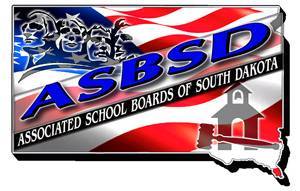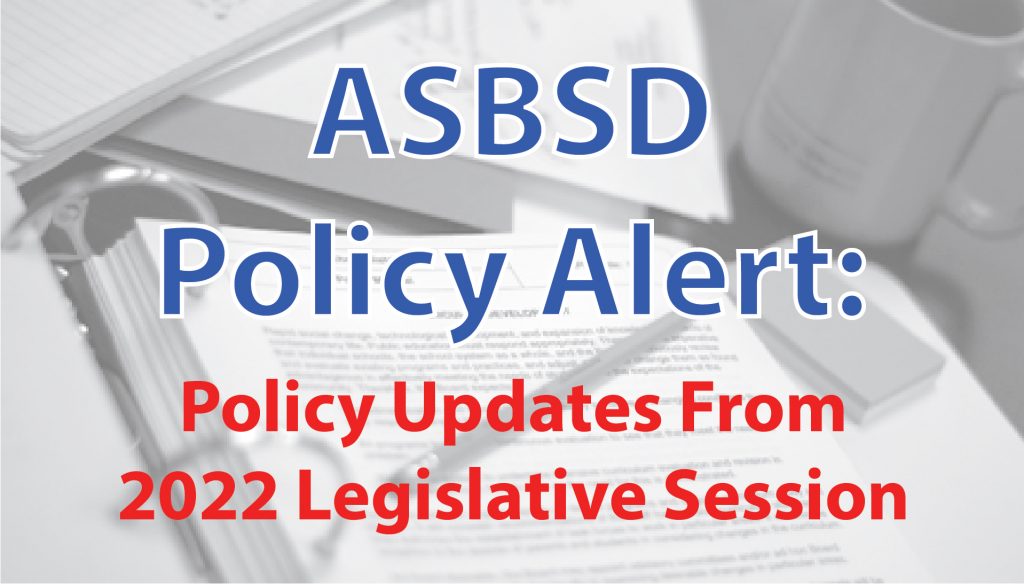Recap of bills signed into law during the 2022 Legislative Session relevant to public education in South Dakota. To view the bill, click on the blue link.
HB 1087: Revise certain provisions regarding records that are not open to inspection and copying and deliberations in an executive or closed meeting.
Summary: Incorporates SDCL 1-27-1.5(8) and 1-27-1.5 (17) into the language of the executive session statute (SDCL 1-25-2) and includes cyber security plans as a discussion topic during executive session and within the list of documents not open to inspection or copying.
Legal/Practice Impact: The reasons for executive session are inclusively listed within SDCL 1-25-2 without having to look at a separate section of SD Codified Law.
Policy Impact for School Boards: None.
HB 1119: Revise the general state aid formula to provide adjustment for alternative education students participating in interscholastic activities.
Summary: Districts will receive funding for children receiving alternative instruction who participate in SD High School Activities Association activities. Fall enrollment is determined by the number of K-12 students, and added to that number is the product of 0.10 multiplied by the number of alternative instruction children who participated in the prior school year in high school interscholastic activities sanctioned or sponsored by the SD High School Activities Association.
Legal/Practice Impact: Keep track of alternative instruction students who participate in SDHSAA sanctioned/sponsored activities.
Policy Impact for School Boards: None.
HB 1185: Permits the wearing of a beaded graduation cap at a school honoring or graduation ceremony.
Summary: The law which states that schools cannot prohibit any person from wearing traditional tribal regalia or objects of cultural significance (i.e., an eagle feather or eagle plume) has been amended and clarified. The law now states that schools cannot prohibit any Native American student from wearing an eagle feather, eagle plume, or an appropriate beaded graduation cap at a school honoring or graduation ceremony.
Legal/Practice Impact: The law gives discretion to school administrators to determine the ‘appropriateness’ of beaded graduation caps. Any decision to deny a student’s beaded graduation cap should be made deliberately and cautiously and with the help of the school’s attorney, as a denial may be interpreted as discriminatory on the basis of race/religion or as a violation of a student’s symbolic free speech rights or other alleged legal violations that may spur a claim against the school district. This law takes effect July 1, 2022, after this year’s high school graduation ceremonies have occurred.
Policy Impact for School Boards: ASBSD will not be incorporating the new law into its sample policies.
HB 1308: Provides for the payment of signing bonuses to school district staff members.
Summary: Schools are allowed to offer a signing bonus, moving expenses, or tuition reimbursement to staff members, upon the signing of a contract by both parties.
Legal/Practice Impact: Previously, these bonuses were only allowed to be provided to teachers. Now, these bonuses can also be provided to staff members.
Policy Impact for School Boards: ASBSD has modified its sample policy GCD, Professional Staff Hiring, to reflect the school’s ability to offer the bonuses to all staff members.
HB 1337: Protect elementary and secondary students from political indoctrination.
Summary: This bill contained what is commonly referred to as a Critical Race Theory (CRT) concepts.
Legal/Practice Impact: This bill was killed and is not law. However, if schools are concerned or curious about control of teaching methodologies related to sensitive issues, please look at ASBSD Sample Policies INB: Teaching About Controversial Issues and IB: Academic Freedom.
Policy Impact for School Boards: This bill has no policy impact because it did not become law. Schools may already have in place or otherwise consider adoption of ASBSD Sample Policy INB, Teaching About Controversial Issues and Sample Policy IB, Academic Freedom.
SB 46: Protect fairness in women’s sports.
Summary: Schools must designate any sponsored or sanctioned athletic team, sport, or event as (1) female; (2) male; or (3) co-ed, based on the biological sex of the student at birth. Only female students, based on their biological sex, may participate in any activity designated as being for females. Students who are directly or indirectly harmed by a school’s violation of this law may seek legal relief. Students who are subjected to retaliation or other adverse action by a school as a result of reporting a school’s violation of this law to a school employee, representative of the school, school district, activities association, or state/federal governmental entity may also seek legal relief.
Legal/Practice Impact: Schools are encouraged to be familiar with the legal requirements contained in this bill. The law provides that the attorney general and the state will be responsible for defense of and financial responsibility incurred by schools who comply with the requirements of this law which results in a lawsuit or the filing of a complaint.
Policy Impact for School Boards: None. SDHSAA may revise its rules and/or practices.
SB 122: Prohibit private funding of election costs except for gifts of a nominal and intrinsic value.
Summary: Schools cannot accept any funds, grants, or gifts for election costs from any source other than a governing body of a political subdivision, the state, or the federal government, unless the gifts are of a nominal and intrinsic value, as defined by the State Board of Elections, who will promulgate rules to define nominal and intrinsic value.
Legal/Practice Impacts: Schools should not accept funds or gifts for election costs from anyone other than a governmental entity, unless the gifts have a nominal and intrinsic value. The SD State Board of Elections will be promulgating administrative rules to define ‘nominal and intrinsic value.’
Policy Impact for School Boards: ASBSD has updated its sample policies KMI: Relations With Political Organizations (Public Funds) and GBGA: District Involvement in Political Activity, to reflect the prohibition of schools accepting election costs from sources other than a governmental unit.
SB 4 and SB 26: Revises the written certification required for medical cannabis and revises the definition of practitioner for purposes of medical cannabis.
Summary: Written certifications for medical cannabis can be signed by a physician assistant or advanced practice registered nurse in addition to a physician. The new law changes what needs to be contained in the written and signed written certification, including an expiration date, and also clarifies that the registry identification card of a qualifying patient and a designated caregiver expires on the date noted by the practitioner in the written certification, not to exceed one year.
Legal/Practice Impacts: ASBSD’s sample policy JHCDE: Administration of Medical Cannabis to Qualifying Students requires a written certification to be provided before administration of medical cannabis is allowed on school property. The law of what type of practitioner can sign the written certification and what the written certification must contain, including an expiration date of the certification for the qualifying patient as well as the designated caregiver, and therefore the school should be mindful of what is required to be provided by the qualifying student’s parent/guardian in the written certification document.
Policy Impact for School Boards: ASBSD has updated its sample policy JHCDE: Administration of Medical Cannabis to Qualifying Students and the accompanying exhibit JHCDE-E(1): Medical Cannabis Administration Plan to revise the definition of practitioner and what needs to be included in the written certification that is provided to the school.
SB 5: Revises acceptable conduct related to the medical use of cannabis.
Summary: Defines “under the influence of cannabis” and “safety-sensitive job”; allows imposition of penalties for performing a safety-sensitive job under the influence of cannabis; increases employers’ ability to restrict ingestion as well as possession, transfer, display, or transportation of medical cannabis in the workplace and allows employers to establish and enforce a drug free workplace policy that may include a drug testing program.
Legal/Practice Impacts: Before restricting an employee’s use of medical cannabis in the workplace or penalizing an employee for being under the influence of cannabis, ASBSD recommends schools discuss with their local school attorney.
Policy Impact for School Boards: Currently, ASBSD’s sample policy GBEC: Use of Alcohol, Drugs, and Controlled Substances broadly encompasses the language of this new law by stating that employees cannot manufacture, use, possess, sell, distribute or be under the influence of medical cannabis in any manner inconsistent with South Dakota state law. Any new ASBSD sample policy specifically addressing this topic may take place in the future, after discussions with the SD Council of School Attorneys.
For other new laws affecting education, please see ASBSD’s Billtracker page (click link).
For questions related to the policies, contact Filler at jfiller@asbsd.org or at 605-773-2513.
To access the ASBSD Policy Services website, school board members and administrators must login at http://policy.asbsd.org. Your district’s login and password information has been previously provided to your district’s administration.
Note: For ASBSD member schools who are Online Policy Services subscribers you may access a PDF copy of the modifications made to these policies through your school districts online policy site, simply choose the ASBSD Communications option under the Policies tab.
If you are not able to access the ASBSD Policy Services website, please contact your district’s administration or ASBSD Policy Services Associate Kay Thompson-Tieszen at kay@asbsd.org.

